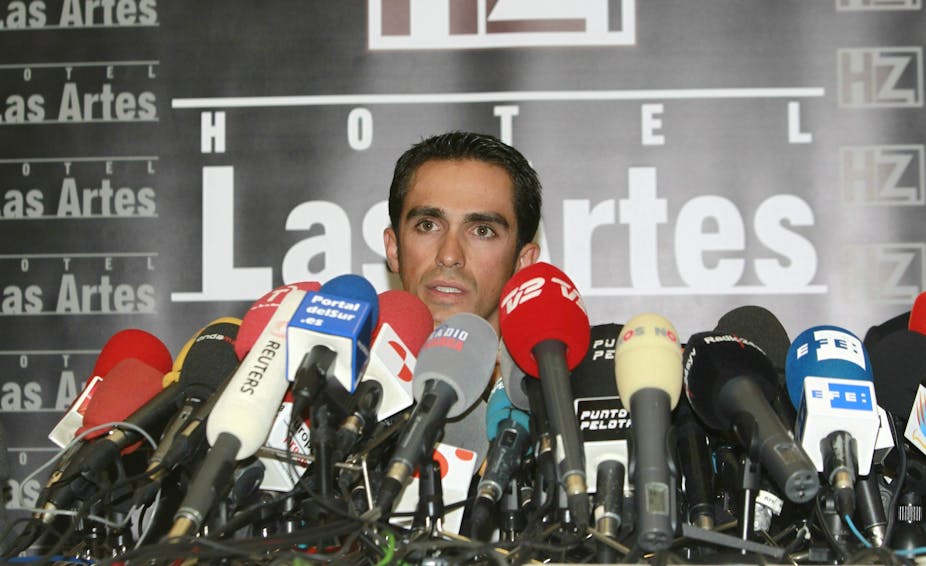On the day the Court of Arbitration for Sport (CAS) handed down its decision on the Alberto Contador doping case, Cadel Evans – Australian Tour de France champion – was quoted in the cycling press repeating two of the institutional mantras of professional cycling.
The first mantra was one often employed by cycling’s governing body, the UCI, and by others such as Lance Armstrong, seven-time Tour de France winner:
“Cycling has done more than enough to show it’s doing the right things when it comes to the fight against drugs …
"Now it’s time for other sports to look to cycling and replicate what we do so the fight against drugs in sports can maybe be beaten one day across all sports.”
Evans was reported as saying he had followed the Contador case from afar and trusted the authorities to do their job: “I don’t know all that goes on behind there and what all the real facts are and so on … I go along and do my job and that’s up for the authorities to decide.”
The other received wisdom repeated by Evans is the claim that the Contador case took too long and thus created uncertainty for the sport:
“It was a case that dragged on for so long I had no idea what was going on and what was going to happen. […] I just read the newspapers like the rest of us.”
Such a conclusion has even been repeated by academics in their commentary on the case on The Conversation.
As I have considered when discussing the Operación Puerto doping investigation in the past, this “need for speed” attitude has been deeply embedded in media coverage of the event. The rhetoric runs that Spanish justice was too slow and stood in the way of the certainty required for the sport and its sponsors.

The legal scholar Professor William E Scheuerman has written extensively on the danger of this need for legal speed, which he says jeopardises freedom and undermines the rule of law.
He argues the motorisation of the law – its increasing use of technical and scientific standards – undermines traditional legal reasoning, saying: “law making procedures become ever faster and more circumscribed, the path towards the achievement of legal regulation shorter, and the share of jurisprudence smaller”.
In the world of anti-doping and professional cycling this requirement for speed manifests itself in an avoidance of the tardy processes of national law courts and a preference for arbitration.
It promotes a situation whereby presumed guilt and judgment through the media is the norm rather than traditional methods of legal determination. Furthermore the principle of strict liability means the only recourse available is of a formal procedural type. Under the rules of strict liability a cyclist is suspended provisionally once they return a positive test result – indeed this is what happened to Contador in 2010.
He was able to return to cycling in the interim because he was in fact acquitted by the relevant Spanish authorities. In February last year, the then President José Luis Rodríguez Zapatero publicly stated on the government’s Twitter page: “there’s no legal reason to justify sanctioning Contador”, a position supported by his opponent and successor, current President Mariano Rajoy.
Their reasoning was supported by that of Angel Juanes, the president of Audiencia Nacional (the Spanish High Court) who questioned the constitutionality of the strict liability principle, which removes the presumption of innocence.
Nevertheless, once exonerated by the Spanish cycling federation, Contador was free to compete until the hearing of the appeal.
Putting aside all the other issues at play in Contador’s case – and I’m not entering into the question of whether he is guilty or not – was it really the drawn-out affair that the received wisdom says it was? Did it really take a long time?
In reality, it was only 16 months from when the Contador case became public (in late September 2010) until the CAS decision earlier this week.
That period includes the opening of the case, the hearing and decision by the Spanish cycling federation, the preparation and hearing of the appeal in CAS, not to mention the time it took the three arbitrators to write their 98-page, 514-paragraph decision.
Given the complexity of the case, the evidence adduced and the maze of scientific and legal issues at stake, is it really fair or accurate to describe this as a drawn-out affair?
Remember that there’s plenty at stake in the Contador case. It not just the cyclist’s reputation on the line (there is also considerable ambiguity in the CAS decision as to whether Contador intentionally doped), but also his name on the record books of the 2010 Tour de France and the 2011 Giro d’Italia.
Along with this, the UCI is seeking a fine from Contador to the tune of €2,485,000. The CAS has yet to decide upon this aspect of the case.
Bloomberg News has put the potential financial cost of the case to Contador as being in the vicinity of US$6m, once you consider the fine and legal costs.
But this figure does not seem to take into account the ramifications for Contador’s earnings this year, nor his potential loss of sponsorship.
Would we really state an investigation, court hearing and appeal process was tardy and drawn-out if what was at stake was a wealthy entrepreneur who’d had their reputation trashed, was exposed to being banned from performing their business and exposed to a A$3m fine, among other significant financial losses?
Given what was at stake, I’m not sure we would.
If we judge it by traditional legal standards and the length of most court cases in our legal system, the Contador’s case was definitely not drawn out.
See Alberto Contador banned for doping, but what is clenbuterol? by Laura Corbit on The Conversation.

